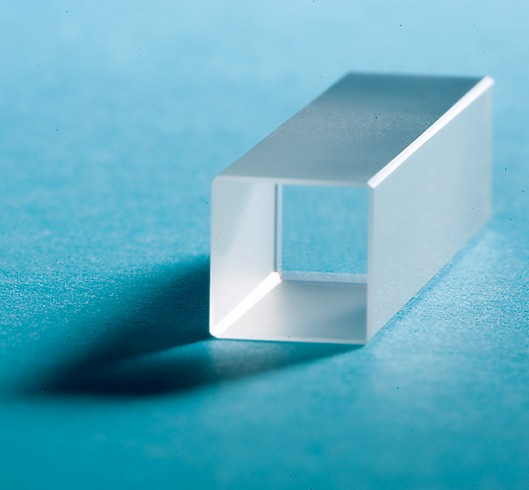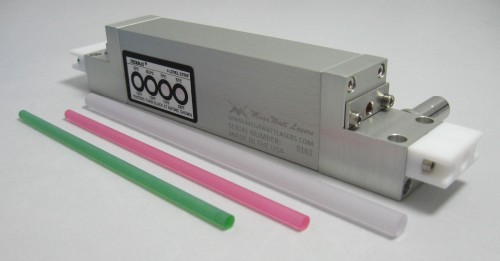doped insulator lasers (original) (raw)
Definition: lasers with a solid-state gain medium containing a laser-active dopant
Alternative term: ion-doped solid-state lasers
Categories:  optical materials,
optical materials,  laser devices and laser physics
laser devices and laser physics
Related: solid-state laserslaser crystalslaser glassesrare-earth-doped laser gain mediatransition-metal-doped laser gain media
Page views in 12 months: 222
DOI: 10.61835/0ya Cite the article: BibTex BibLaTex plain textHTML Link to this page! LinkedIn
Content quality and neutrality are maintained according to our editorial policy.
📦 For purchasing laser crystals, use the RP Photonics Buyer's Guide — an expert-curated directory for finding all relevant suppliers, which also offers advanced purchasing assistance.
What are Doped-insulator Lasers?
The term doped insulator lasers is sometimes used to more precisely address a specific class of solid-state lasers. These have a laser gain medium which is a transparent and electrically insulating solid material, in which the laser amplification is done by some laser-active dopant. The host medium can be a single crystal (a monocrystalline medium), a glass or a (polycrystalline) ceramic. The laser-active constituents are dopant ions of one of two types:
- trivalent rare earth ions (e.g. Nd3+, Yb3+ or Er3+)
- in laser gain media like Nd3+:YVO4or Yb3+:YAG
- transition metals (e.g. Ti3+, Cr4+, Cr3+ or Cr2+)
- in gain media like Ti3+:sapphire or Cr3+:LISAF
Not included in doped insulator lasers are lasers with other solid-state gain media such as semiconductor lasers, solid-state dye lasers or color center lasers.
The term solid-state lasers is normally used with the same meaning as doped insulator laser, effectively excluding various types of lasers with solid gain media of other types.
Frequently Asked Questions
This FAQ section was generated with AI based on the article content and has been reviewed by the article’s author (RP).
What is a doped-insulator laser?
A doped-insulator laser is a solid-state laser where the gain medium is an electrically insulating solid, such as a crystal or glass, which is doped with laser-active ions.
What kinds of dopants are used in these lasers?
The dopants are typically ions of either rare-earth elements (like Nd3+ or Yb3+) or transition metals (like Ti3+ or Cr3+).
Are semiconductor lasers a type of doped-insulator laser?
No, semiconductor lasers are not considered doped-insulator lasers. This term is used to distinguish from other solid-state laser types like semiconductor, dye, or color center lasers.
Is 'solid-state laser' the same as 'doped-insulator laser'?
Commonly, yes. The term 'solid-state laser' is normally used with the same meaning, effectively referring to doped-insulator lasers and excluding other solid-state types like semiconductor lasers.
Suppliers
Sponsored content: The RP Photonics Buyer's Guide contains 92 suppliers for laser crystals. Among them:
⚙ hardware
Laser crystals of various materials including neodymium-doped yttrium aluminum garnet (Nd:YAG), Yb-doped potassium gadolinium tungstate (Yb:KGW), Yb-doped potassium yttrium tungstate (Yb:KYW), Nd-doped potassium gadolinium tungstate (Nd:KGW, titanium-doped sapphire (Ti:sapphire) are available from EKSMA Optics.
⚙ hardware
GWU offers all common laser crystals (Nd:YVO4, Nd:YAG, Yb:YAG etc.) with a broad variety of specifications. Besides the well-established materials, innovative crystals with outstanding properties like Yb:CALGO can open new horizons for demanding laser applications. No matter whether individual pieces for R & D purposes are required or cost-efficient numbers in small, medium or large batches with in-time delivery for the production line are needed: GWU’s dedicated service helps to find the best core components for your application. GWU-Lasertechnik has more than 30 years of experience in distributing laser crystals. Choose GWU to benefit from our wide knowledge and in-field experience!
⚙ hardware
ALPHALAS offers many standard laser crystals like Nd3+:YAG, Yb3+:YAG, Nd3+:YVO4 and Nd3+:GdVO4 with large stock inventory. Customer-specific dimensions, doping levels as well as HR, PR and AR coatings are also available.
⚙ hardware🧩 accessories and parts🧴 consumables🔧 maintenance, repair📏 metrology, calibration, testing💡 consulting🧰 development
Shalom EO offers various kinds of laser crystals, including: Nd:YAG, Nd:Ce:YAG, Nd:YVO4, CTH:YAG, Er:YAG, Yb:YAG, Ti:sapphire crystals and diffusion-bonded crystals. Nd:YAG and Nd:YVO4 are popular crystals for 1064-nm lasers, Nd:Ce:YAG, CTH:YAG, and Er:YAG crystals are often used in the medical and cosmetic lasers, Ti:sapphire is for ultrafast lasers, alexandrite is for long-pulsed and picosecond 755-nm lasers, diffusion bonding crystals are useful for OEM compact lasers.
⚙ hardware
Optogama supplies high-performance laser crystals engineered for demanding applications in scientific, industrial, and medical systems. Our crystal portfolio includes a wide variety of doped materials optimized for different laser wavelengths and performance needs:
- Yb-doped: Yb:KGW, Yb:KYW, Yb:CaF₂ — excellent for high-power, ultrafast lasers
- Nd-doped: Nd:KGW, Nd:YLF — widely used for nanosecond pulsed systems
- Ti:sapphire — ultrafast laser gain medium with broad tunability
- Er:Yb:phosphate glass & Er:Yb:YAB — efficient gain media for compact eye-safe lasers
- Tm:YLF, Ho:YLF, Pr:YLF — suitable for mid-infrared and eye-safe spectral ranges
Our crystals are precisely cut, polished, and coated to meet tight optical tolerances, excellent beam quality, thermal handling, and reliability under high pump powers.
⚙ hardware
MegaWatt Lasers Inc. has a large inventory of Nd:YAG, Er:YAG and CTH:YAG laser rods. We also can assist in the design and modeling for various applications.
Questions and Comments from Users
Here you can submit questions and comments. As far as they get accepted by the author, they will appear above this paragraph together with the author’s answer. The author will decide on acceptance based on certain criteria. Essentially, the issue must be of sufficiently broad interest.
Please do not enter personal data here. (See also our privacy declaration.) If you wish to receive personal feedback or consultancy from the author, please contact him, e.g. via e-mail.
By submitting the information, you give your consent to the potential publication of your inputs on our website according to our rules. (If you later retract your consent, we will delete those inputs.) As your inputs are first reviewed by the author, they may be published with some delay.











